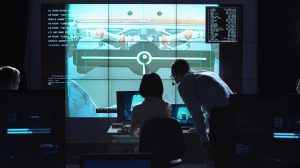Become a Flight Operations Officer
When it comes to air travel, most passengers feel that they are solely relying on the decisions of the pilots in the cockpit. Although this is true, these professionals are not the only ones who rely on them. Flight Operations Officers / Dispatch Officers (OOV / OD) collaborate with other aeronautical professionals to ensure a secure flight.
What does a Flight Operations Officer / Dispatch Officer do?
The Flight Operations Officer / Dispatch Officer is in charge of validating all systems that allow for mass and balance calculations, route planning, results, meteorological analysis, and everything else needed for a safe flight.
Aside from these duties, the Flight Operations Officer / Dispatch Officer is responsible for checking visibility at the departure airport, as well as conditions at the destination airport and alternate airports. To provide accurate information to pilots so that missions can be completed safely and on time, extensive knowledge of meteorological analysis is needed.
Due to their comprehensive training, most Flight Operations Officers / Dispatch Officers have as much theoretical knowledge as a Pilot.

The official Flight Operations / Dispatch Officer (OOV / OD) license allows the holder to dispatch flights after reviewing all applicable operational details, preparing and delivering an operational analysis (briefing), and having the commanding pilot confirm it.
 A communications system between an airline’s operations and its aircraft is necessary for aviation to work. As a result, the holder of an official operations license conducts operational flight control by maintaining efficient communications with any aircraft and, if necessary, providing relevant information to the analysis for the safe conduct of the flight.
A communications system between an airline’s operations and its aircraft is necessary for aviation to work. As a result, the holder of an official operations license conducts operational flight control by maintaining efficient communications with any aircraft and, if necessary, providing relevant information to the analysis for the safe conduct of the flight.
The Flight Operations Officer / Dispatch Officer (OOV / OD) course is obviously a great choice if you’re considering an aviation career that helps you to develop a thorough aeronautical culture.
- Have completed the high school.
- Have knowledge of English language.
 This course is a great opportunity for professionals who are already working in the aviation market and want to complement their training ir order to process in their career. Namely, for operation assistants, flight attendants, board technicians, graduated or attending a degree in areas related to aeronautics ( aeronautical management, aeronautical engineering, aerospace engineering), planning assistants, traffic technicians and stopovers, etc…
This course is a great opportunity for professionals who are already working in the aviation market and want to complement their training ir order to process in their career. Namely, for operation assistants, flight attendants, board technicians, graduated or attending a degree in areas related to aeronautics ( aeronautical management, aeronautical engineering, aerospace engineering), planning assistants, traffic technicians and stopovers, etc…
As agreed in international legislation, namely ICAO and EASA, Flight Operations Officer / Dispatch Officer functions are indispensable for any aline in the world.

The objective of a Flight Operations Officer / Dispatch Officer (FOO/OD) Course is to prepare the student, with or without experience in aviation, to obtain an ICAO Aeronautical License regarding his/her profession. The student will be able to perform its functions and responsibilities, described in the International Civil Aviation Organization (ICAO) and National Aviation Regulators from every country. Candidates for this course must attend an approved training organization (ATO) certified for the purpose. This training will allow the appropriate, proper control and supervision of the operation of the aircraft.
After completing the theoretical course and obtaining approval in the respective exams at ANAC, the student must have the capacity to perform all the functions inherent to the realization of an operational flight plan, namely:
- Determine, based on the analysis of ‘notes’, meteorological and air traffic restrictions, the ideal route of a flight in terms of consumption, flight time and weather conditions during a mission;
- Follow up a flight taking into account adverse operations, providing updated information to the crew on any changes to the initial planning;
- Demonstrate knowledge of the technical terms in English, being able to transmit to the commanding pilot any information necessary for the flight to take place safely (consulting technical manuals, meteorology, navigation and operational procedures, national and international legislation and the appropriate phraseology for aeronautical fragilities where include alert and emergency situations);
- To characterize the principles of aviation, as well as to distinguish the different types of aircraft performance;
- Distinguish the fundamental principles of radio navigation;
- Distinguish the importance of meteorology in flight operations;
- Know the aeronautical legislation and comply with the required safety standards.

